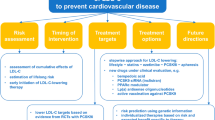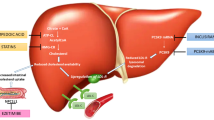Abstract
Aggressive lipid lowering was initially controversial due to evidence from epidemiologic studies that implied an increase in total mortality with low cholesterol levels combined with equivocal results from early trials utilizing bile acid resins or fibric acid derivatives. The advent of statin therapy allowed significant reductions of circulating lipid levels and clearly reduced cardiovascular morbidity and mortality. Additionally, in adequately powered trials, total mortality was also reduced. The optimal level of circulating low-density lipoprotein (LDL) has not been definitely established. However, recent clinical trials with aggressive lipid goals have established that LDL cholesterol can be significantly lowered below 100 mg/dL with improvement in both surrogate measurements and hard clinical endpoints. Ongoing clinical trials have been initiated that will determine the optimal level of LDL cholesterol that will insure cardiovascular benefits and establish the risk-benefit relationship of aggressive pharmacologic lowering of circulating lipid levels.
Similar content being viewed by others
References and Recommended Reading
AHA Heart Facts. Dallas, TX: American Heart Association; 2005.
Stamler J, Wentworth D, Neaton JD, for the MRFIT Research Group: Is relationship between serum cholesterol and risk of premature death from coronary heart disease continuous and graded? Findings in 356,222 primary screenees of the Multiple Risk Factor Intervention Trial (MRFIT). JAMA 1986, 256:2823–0.
Lipid Research Clinics Programs: The Lipid Research Clinics Coronary Primary Prevention Trial results: I. Reduction in the incidence of coronary heart disease. JAMA 1984, 251:351–364.
Frick MH, Elo O, Haapa K, et al.: Helsinki Heart Study: primary prevention trial of gemfibrozil in middle-aged men with dyslipidemia: safety of treatment, changes in risk factor and incidence of coronary heart disease. N Engl J Med 1987, 317:1237–1245.
Jacobs D, Blackburn H, Higgins M, et al.: Report of the conference on low blood cholesterol: mortality associations. Circulation 1992, 86:1046–1060.
Golomb BA, Stattin H, Mednick S: Low cholesterol and violent crime. J Psychiatr Res 2000, 34:301–309.
Iribarren C, Reed DM, Chen R, et al.: Low serum cholesterol and mortality. Which is the cause and which is the effect? Circulation 1995, 92:2396–2403.
The Post Coronary Artery Bypass Graft Trial Investigators: The effect of aggressive lowering of low-density lipoprotein cholesterol levels and low-dose anticoagulation on obstructive changes in saphenous-vein coronary-artery bypass grafts. N Engl J Med 1997, 336:153–163.
Taylor AJ, Kent SM, Flaherty PJ, et al.: Arterial biology for the investigation of the treatment effects of reducing cholesterol. Circulation 2002, 106:2055–2060.
Nissen SE, Tuzcu EM, Schoenhagen P, et al.; REVERSAL Investigators: Effect of intensive compared with moderate lipid-lowering therapy on progression of coronary atherosclerosis: a randomized controlled trial. JAMA 2004, 291:1071–1080.
Cannon CC, Braunwald E, McCabe CH, et al.: Comparison of intensive and moderate lipid lowering with statins after acute coronary syndromes. N Engl Med 2004, 350:1495–1504.
Knatterud GL, Rosenberg Y, Campeau L, et al.: Long-term effects of aggressive lowering of LDL cholesterol levels and low dose warfarin. Circulation 2000, 102:144–146.
Koren MJ, Hunninghake DB: Clinical outcomes in managed care patients with coronary artery disease treated aggressively in lipid-lowering disease management clinics: the ALLIANCE Study. J Am Coll Cardiol 2004, 44:1772–1779.
The 4S Investigators: Randomised trial of cholesterol lowering in 4444 patients with coronary heart disease. The Scandinavian Simvastatin Survival Study(4S). Lancet 1994, 8934:1383–1389.
LaRosa JC, Grundy SM, Waters DD, et al.: Intensive lipid lowering with atorvastatin in patients with stable coronary disease. N Engl J Med 2005, 352:1425–1435.
Wiviott SD, Cannon CP, Morrow DA, et al.: Can low density lipoprotein be too low: the efficacy and safety of achieving very low density lipoprotein levels with intensive statin therapy. J Am Coll Cardiol 2005, 46:1411–1416.
Castelli WP, Garrison RJ, Wilson PW, et al.: Incidence of coronary heart disease and lipoprotein cholesterol levels. The Framingham Study. JAMA 1986, 256:2835–2888.
Keys A (ed): Coronary heart disease in seven countries. American Heart Association Monograph 29. Circulation 1970, 41(Suppl 1):1.
Marmot MG, Syme SL, Kagan A, et al.: Epidemiologic studies of coronary heart disease and stroke in Japanese men living in Japan, Hawaii and California: prevalence of coronary and hypertensive heart disease and associated risk factors. Am J Epidemiol 1975, 102:514.
de Lemos JA, Blazing MA, Wiviott SD, et al.: Early intensive versus delayed conservative simvastatin strategy in patients with acute coronaty syndromes. JAMA 2004, 292:1307–1316.
NCEP Report. Implications of Recent Clinical Trials for the National Cholesterol Education Program Adult Treatment Panel III Guidelines. Circulation 2004, 110:110–127.
Author information
Authors and Affiliations
Corresponding author
Rights and permissions
About this article
Cite this article
Todd, J., Farmer, J.A. Optimal low-density lipoprotein levels: Evidence from epidemiology and clinical trials. Curr Atheroscler Rep 8, 157–162 (2006). https://doi.org/10.1007/s11883-006-0053-5
Issue Date:
DOI: https://doi.org/10.1007/s11883-006-0053-5




